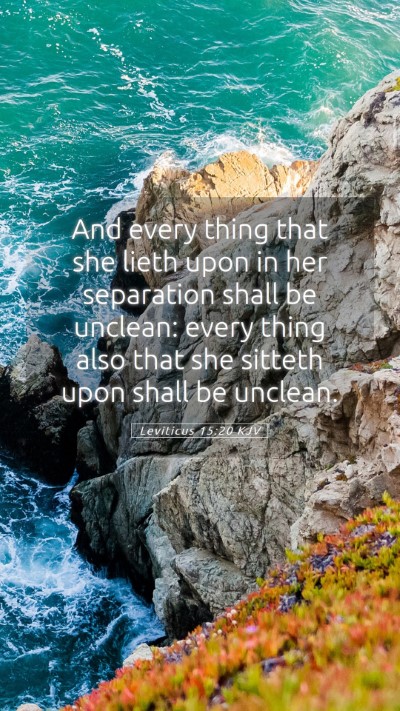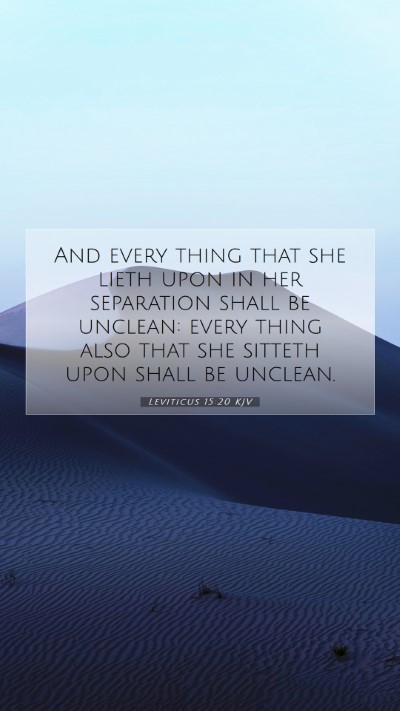Understanding Leviticus 15:20 - Bible Verse Interpretations
Leviticus 15:20 states: "And if she be in her separation, and have an issue, she shall be unclean as long as she is in her separation: and whatsoever she touches shall be unclean, and the vessel that she sitteth upon shall be unclean." This verse offers significant insight into the ceremonial laws regarding cleanliness in ancient Israel, particularly focusing on issues related to bodily discharges.
Bible Verse Meanings and Explanations
This verse is part of a larger set of laws given to the Israelites, emphasizing the importance of ritual purity and the concept of uncleanness. Here are some key interpretations gathered from notable public domain commentaries:
- Matthew Henry's Commentary: Henry outlines that the laws given in Leviticus serve two primary purposes: maintaining ritual purity and establishing a social distancing during times of bodily discharges. He emphasizes that such regulations reflect God’s holiness and the necessity for people to remain ceremonially clean when approaching Him.
- Albert Barnes' Notes: Barnes highlights the health implications of these laws. He notes that they were not simply arbitrary but had practical purposes, protecting the health of the community. The mention of a woman being unclean during her separation is understood as a measure that God put in place for societal well-being.
- Adam Clarke’s Commentary: Clarke delves into the specifics of the separation period, suggesting that it served a dual purpose. While it was a physical state, it also provided an opportunity for spiritual reflection and renewal. He points out that cleanliness is an attribute associated with God, and maintaining purity was essential for worship.
Scripture Analysis: Cultural and Historical Context
To fully understand Leviticus 15:20, it's essential to consider the cultural backdrop of ancient Israel.
- Ritual Cleanness: In ancient Israelite culture, bodily discharges were seen as a source of ritual impurity. This concern was not merely about hygiene but was deeply intertwined with the community’s relationship with holiness and the divine.
- Women’s Separation: The context of this verse specifically addresses women, reflecting societal attitudes towards menstruation. This separation was meant to uphold community standards of purity.
- Holiness Code: Leviticus 15 is part of the Holiness Code, which outlines what it means to be holy as God is holy. The regulations surrounding bodily discharges serve as reminders of God’s purity and the call for His people to embody that purity.
Application of Leviticus 15:20 in Daily Life
Understanding the implications of this verse extends beyond the historical context, offering lessons relevant for Bible study groups and individuals today:
- Significance of Holiness: The verse drives home the point that holiness is not just an abstract concept but is expressed through our actions and interactions with others.
- Social Responsibility: The requirement for cleanliness offers lessons about how our actions can impact others, emphasizing the importance of being considerate and respectful in community settings.
- Reflective Practices: The separation mentioned in this verse can be seen as an invitation for introspection and spiritual renewal, encouraging individuals to take time away for personal reflection.
Bible Study Insights and Tools
For anyone interested in diving deeper into the meaning of Bible verses like Leviticus 15:20, various tools and resources can enhance understanding:
- Bible Study Guides: Utilize guides that break down Scripture to explain cultural and historical contexts.
- Online Bible Study Courses: Engage in structured learning that assists in understanding difficult passages.
- Community Bible Study Groups: Join groups for collective exploration of Scripture, promoting discussion and varying viewpoints.
Cross References
Leviticus 15:20 can be related to several other biblical texts that enhance its understanding:
- Leviticus 11:24-28: Discusses the concept of cleanliness related to animals.
- Numbers 19:1-22: Details further regulations around purification practices.
- Hebrews 12:14: Encourages the pursuit of holiness, showing its continual relevance in a believer's life.
Conclusion
The study of Leviticus 15:20 reveals much about the intersection of ritual purity, societal norms, and the overarching character of God as portrayed through the Scriptures. The implications of understanding this verse stretch into practical applications of holiness and community living today.


